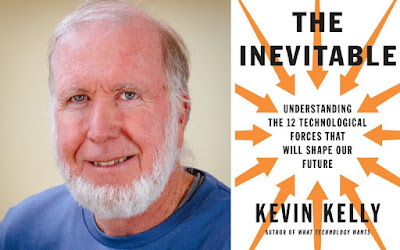Things we can’t stop include massive copying, massive tracking and total surveillance, decentralized ownership, virtual reality that is actually real, and improved artificial intelligence and robots that will both take our jobs and create new businesses. Kelly writes that we need to embrace these changes. We don’t want to fight any one invention because the scientific process has made it so that we’ll take “solid things - an automobile, a shoe - and turn them into intangible verbs. Products will become services and processes. Embedded with high doses of technology, an automobile becomes a transportation service … rapidly adapting to customer usage, feedback, competition, innovation, and wear.”
Kelly has organized his book into 12 categories that are verbs like "accessing, tracking, and sharing" and posits that we look at technology this way instead of "iPhone, Uber, or shoe." Which products or companies will succeed or fail is unpredictable because those are determined by fads, fashion, and commerce.
“Becoming” is the first area of focus. In the 1980s and 90s, young boys in chatrooms and Wall Street traders used the internet but leaders at ABC TV, WIRED, and many others scoffed at the thought of the internet going big. Many thought there would be 500 or so channels on TV that would be where the content would be created. “Instead, billions of users created the content for all the other users. There were 500 million channels.” The internet stuff the execs couldn’t imagine was that passive consumers would become active creators. We still fail to truly grasp how awesome the web has become, with its 60 trillion web pages (about 10,000 for every person alive).
The corporations eventually realized the online world could be their distribution network, but they did not foresee that they wouldn’t be the ones making the content. YouTube, blogs, and social media were not created by big-media’s staff but by their users. We no longer even typically get customer service anymore from corporations because we can ask the global community congregating at places like Reddit subgroups.
By now, the internet feels completely bloated, with “more than enough content to demand our attention for the next million years.” But Kelly claims, in reality, “nothing has happened yet! The internet is still at the beginning of its beginning.” For instance, by 2050, just about everything with have a little AI added to it. “The last 30 years has created a marvelous starting point, a solid platform to build truly great things.” We are just now “becoming” and the coolest inventions are yet to happen.
“Cognifying” is the second inevitable and it’s all about AI. Granted, this book was released seven years ago so quite a bit has already happened, but perhaps not as much has happened as one would think. “At the rate AI is improving, a kid born today will rarely need to see a doctor to get a diagnosis by the time they are an adult.” AI will not look like HAL 9000 - “a discreet machine animated by a humanlike consciousness” - but rather like Amazon Web Services, “a cheap, reliable industrial-grade digital smartness running behind everything and almost invisible except when it blinks off.”
One example of being cognitive is photography. Years ago, it would have taken $100,000 and hefty bags of equipment to do everything cameras and iPhones do today to make photos treated, modified, and beautiful. Other examples could include music created in real-time as needed for soundtracks or video games, smart clothes that tell laundry machines how to wash them, advertising optimized for how many people follow and watch and what their level of influence is, matching buyers and sellers of real estate, real-time adjustments of medical care and treatments, dolls that will probably be the first really popular robots, and stats on every breath and movement of athletes to create highly advanced fantasy sports.
Google has been working on AI for decades and has always seen its search engine as a way to refine its AI rather than AI as a way to improve its search engine. Google has indeed been buying up lots of AI companies and, by its own predictions, AI should be its main product by 2026. This would be pure hyperbole, except three recent breakthroughs have made the ancient promise of AI possible: “parallel computation” has become so cheap that companies are able to use it in ways that Facebook can identify friends easily in photos and Netflix can make reliable recommendations, it’s taken a long time to get enough big data fed into the system for computers to get this smart, and the growing amount of users is helping to make it all even smarter.
By 2100, Kelly predicts that 70 percent of the jobs people do will be replaced by automation. Assembly-line and factory workers will be the first to go. Pharmacists will be replaced by pill-dispensing machines. Office and school cleaners, truckers, and information-intensive white-collar jobs are in the AI path. But these aren’t things to worry about. No Victorian boy ever dreamed of one day becoming a professional video-game developer. Those who once farmed began working in factories and then later moved to other jobs.
“Today, the vast majority of us are doing jobs that no farmer from the 1800s could have imagined.” AI’s greatest benefit is that it “will help us define humanity. We need AIs to tell us who we are.” It’s not a race against the machines. It’s a race with the machines. “Let the robots take our jobs, and let them help us dream up new work that matters” and helps us become “more human than we were.”

No comments:
Post a Comment